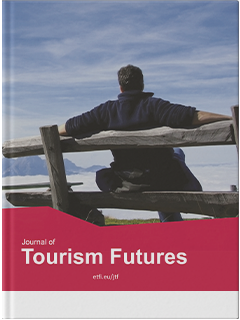甜甜圈目的地:应用Kate Raworth的甜甜圈经济视角重新思考旅游目的地管理
IF 6.6
Q1 HOSPITALITY, LEISURE, SPORT & TOURISM
引用次数: 5
摘要
在这篇观点论文中,作者探索和讨论了如何应用Kate Raworth(2017)的甜甜圈经济观点和随附的“像21世纪经济学家一样思考的七种方式”来更好地重新思考旅游目的地管理的未来。设计/方法论/方法作者采用“可转移性”方法,即作者作为现有作品的读者执行的过程,注意其细节,以便将其与他们熟悉的环境的细节进行比较。在本文中,作者将拉沃斯的工作应用于旅游目的地的环境开发。“甜甜圈经济”的观点和附带的“七种方法”有助于未来的旅游目的地管理,当它被解释和定制为旅游环境并重新定义为“甜甜圈目的地”时,就会更有帮助。原创性/价值凯特·拉沃斯的工作已经在学术界、社会和各种(经济)政策领域获得了兴趣和支持。令人惊讶的是,尽管它在最近关于过度旅游、承载能力和可接受变化的限制的讨论中提供了很大的潜力,并且在追求发展智能旅游目的地的过程中为结构监测效果提供了一个可能的框架,但它并没有完全应用于旅游环境。本文章由计算机程序翻译,如有差异,请以英文原文为准。
The Doughnut Destination: applying Kate Raworth's Doughnut Economy perspective to rethink tourism destination management
PurposeIn this viewpoint paper, the authors explore and discuss how Kate Raworth's (2017) Doughnut Economy perspective and accompanying “Seven Ways to Think Like a 21st-Century Economist” can be applied to rethink the future of tourism destination management for the better.Design/methodology/approachThe authors take a “transferability” approach, being a process performed by the authors as readers of existing work noting its specifics in order to compare them to the specifics of an environment with which they are familiar. In this viewpoint paper, the authors apply the work of Raworth to the environment of tourism destination development.FindingsThe Doughnut Economy perspective and the accompanying “seven ways” help forward tourism destination management in the future, even more when it is interpreted and tailored to a tourism context and reconceptualized as the Doughnut Destination as presented in this paper.Originality/valueThe work of Kate Raworth has been gaining interest and support throughout academia, society and in various (economic) policy domains. Surprisingly, it has not been applied to the tourism context to its full extent, even though it offers much potential in recent discussions on overtourism, carrying capacity and limits of acceptable change as well as offering a possible framework to structure monitoring effects in the pursuit of developing smart tourism destinations.
求助全文
通过发布文献求助,成功后即可免费获取论文全文。
去求助
来源期刊

Journal of Tourism Futures
HOSPITALITY, LEISURE, SPORT & TOURISM-
CiteScore
15.70
自引率
6.00%
发文量
64
审稿时长
34 weeks
期刊介绍:
 求助内容:
求助内容: 应助结果提醒方式:
应助结果提醒方式:


